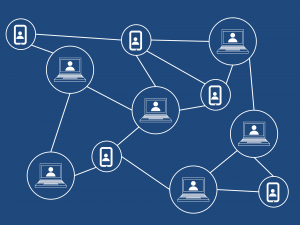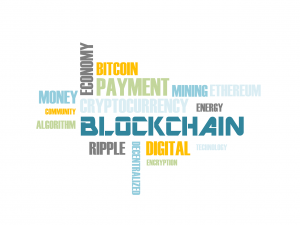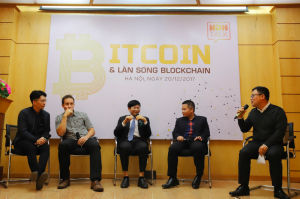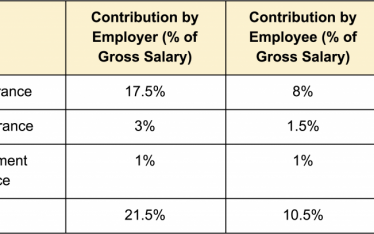1. Definition of Blockchain
According to experts, Blockchain is the technology that stores and transmits information by blocks that are linked together and expanded over time. Each block contains information on the initialization time and is associated with the previous block.
Blockchain is designed to avoid data changes. The information in the blockchain can not be changed (or immutable) and can only be added with the consent of all the nodes in the system. Even if a part of the blockchain system is taken down, other computers and nodes will continue to protect the information.
2. Main features
Blockchain technology acts as a general ledger for all transactions. The main features of blockchain are as follows:
- Cannot be duplicated, and cannot be destroyed. Theoretically, only a quantum computer can intervene and decipher the Blockchain system and it can only be destroyed when there is no internet at that time.
- Immutable once the transaction or data has been written by the private key holder (the only new blockchain owner) that cannot be changed and will be saved forever.
- Data Security: The information, data on blockchain chains are distributed and absolutely secure because only the holder of the private key has access to that data.
- Transparency: Anyone can track the path of a blockchain from one address to another and can record the entire history based on that address.

Smart Contracts are digital embedded by an if-this-then-that (IFTTT) code that allows them to execute themselves. In reality, an intermediary ensures that all parties comply with the terms. Blockchain does not need a third party, as it will ensure that all parties know the contract details, and the terms will be automatically fulfilled once the conditions are met.
Blockchain is essentially a database containing information that is managed concurrently by multiple participants in the system, rather than an individual agency such as the state or the central bank. New information should be accepted by all members of the network before being added to the database.
With Blockchain features, experts say Blockchain technology will open up a potential “applicability” trend for many areas such as banking and finance, retail, transportation, manufacturing and telecommunications.
3. Applications of Blockchain
There are some use cases of Blockchain to the community and our society as a whole.

Applications of Blockchain in various areas
For production:
Basically, Blockchain’s non-destructive characteristics in the manufacturing industry will help consumers trace back the origin of the product being offered. For example: If a dairy producer applies Blockchain to product quality management, the consumer manager can access the information very quickly.
For the manufacturer, they can statistically store all of these boxes on the market to see if they have been consumed, how much they are consumed, how many boxes are in use and how many boxes have expired.
For consumers: Every consumer can check whether the information found on the milk carton is genuine or not. This will help prevent counterfeit products in the market.
For example, in the retail sector, Walmart is perhaps one of the pioneers of blockchain. Currently, the retail brand has used Blockchain since 2016 to track the source of pork imported from China to the United States.
For the health sector:
When patients have their medical check-up, all their results can be stored using Blockchain technology, which means it will help the patient secures all of her information and test results. If the patient is transferred to another hospital, she only needs to retrieve information and her test results on the Blockchain even though the two hospitals (the previous and the current one) are not on the same page, or use different systems.
This would help patients reduce the cost of testing when they arrive at new hospitals, as well as help the doctors have the access to the patient’s history of illness, treatment regimens or other side effects as well as the patient’s previous drug composition. Therefore, they would find it easier to diagnose and provide appropriate treatment for patients.
For education:
In 2010, the PhD from former Microsoft China president Tang Jun which he received from the Pacific Western University had raised some doubts. Investigators found that not only was the school unconfirmed but the school fees was too cheap: only $2,595 and the students did not even have to study for it. Over a year later, dozens other senior managers have been involved in other large-scale impeachments from suspicious programs, requiring only applicants to file “for a fee” for the graduation certificate.
Assessing degrees and certificates are a complex but never obsolete problem for many countries around the globe. When doing a search on Google, we can easily see diplomas and certificates being sold on many websites around the world.
If Blockchain technology is used, the management of the certificates and degrees of universities or vocational training institutions will make student records become more transparent. The employers will also find it easy to track the origin of the training institution or the learning process of the candidates in every level.
In San Francisco, Holberton, a software engineering training school has announced their student management project will be based on Blockchain technologies for the new school year.
Sylvain Kalache, co-founder of Holberton, shared with CNBC: “For employers, they avoid the time it takes to check a candidate’s certification by calling college or paying a third party. This evaluation, along with the use of blockchain technology, will also help the school to save costs in building and operating its own database.”
For the financial sector:
On 16/10/2017, VINEN National Startup Association, Up@VPBank and GPA Fintech and their partners organized a conference “Start of Business 4.0 – Applying Blockchain Technology – Fintech in e-commerce (online payment) and Opportunity to start a business in Vietnam. The event aims to promote international economic integration and to welcome new technologies in the industrial era 4.0.
According to Assoc. Prof. Dr. Dinh Viet Hoa – Chairman of the Vinen National Startup Association, in the 4.0 revolution, Blockchain – Fintech technology is the foundation that will change a lot of old institutions. “Countries that take advantage of the blockchain technology platform will have the opportunity to excel and develop their economy. This revolution will promote all industries including banking, investment, information technology, e-commerce, import-export, real estate, tourism, medical examination and treatment.”
Many banks and other financial institutions have researched and applied Blockchain technology in their operations. Recently, besides JP Morgan doing research on applying Blockchain in their business, 3 major Japanese banks, Mizuho Bank, Sumitomo Mitsui Banking and Bank of Tokyo-Mitsubishi UFJ, has announced the introduction of blockchain technology in their operations. Banks are often complained by consumers for high transaction fees. The blockchain system based on peer-to-peer helps money transfer program provide low-cost, highly-secured, cost-effective financial services – a sector in which large banks are being defeated by their smaller competitors.
For e-commerce:
According to the report: “The future of e-commerce in the FMCG sector”, which is published by Kantar Worldpanel in November 2017, the total sale revenue from e-commerce platforms around the globe increased by 30% in the period from March 2016 to March 2017.
Based on their value, the countries with the top economy in the world, namely China and the US, are the countries contributing the most. However, based on the pace, Thailand, Malaysia and Vietnam is having their e-commerce markets with the fastest development, as Thailand is on the top with 104% increased, Malaysia and Vietnam with 88% and 69% respectively.
According to the experts, the current retail market should gradually alter their service into online shopping, using their brand advantage with omnichannel strategy to achieve success and strengthen their present position in the market. Overall, how to gain more trust by the customers and high fee for distribution system are really big challenges which need to be tackled by corporations so that e-commerce could advance further.
However, those “big” challenges could be easily solved with the help from Smart Contracts using Blockchain Technology. “With the help of Blockchain, we feel more secure when signing the contracts and apply the smart payment solutions into websites. From now on, it is really easy for us to do business and coordinate with other businesses in Vietnam as well as from other countries since the processes are reduced and time is saved a lot.” Ms. Le Thuy Hanh, Co-founder of Batdongsan.com stated.
4. Future of Blockchain in Vietnam

“Bitcoin and Blockchain wave” session (Image from NDH)
On 20/12/2017 in Hanoi, in the sharing session on “Bitcoin and Blockchain wave”, Mr. Nguyen Duy Hung – Chairman of the Board, General Director of Saigon Securities Incorporation (SSI), said that many people are still confused between Bitcoin and Blockchain. However, in essence, these two concepts are completely different. Blockchain development should be encouraged, but virtual money trading for speculation needs to be controlled, avoiding multilevel collapse.
Earlier on that, on 18/12/2017 in Hanoi, a large group of experienced developers introduced a number of solutions that applied the advantages of Blockchain in the management, support enterprises management production, monitoring merchandise quality and e-commerce development through its UHUB ecosystem.
“If the UHUB ecosystem solution is supported, perfected, and widely applied, Blockchain 3.0 technology could be used in financial exchanges, e-commerce, healthcare, education etc… in Vietnam. For example, through the HubExchange, all the fees we currently pay for visas, google ads and Facebook are removed, thereby contributing to the UHUB ecosystem. benefits for the national budget through the form of revenue management and monitoring the payment of taxes into the state budget of the individual business households in particular as well as businesses in general, “said Nguyen Van Yeu.
Blockchain technology will be a trend very soon. Early research and application of this technology will also be an opportunity for Vietnam to take the initiative in the development of the global economy. Among the risks and challenges that blockchain is facing, businesses who want to apply blockchain need to equip themselves with knowledge, skills, and most importantly, human resources ready to face the development of the economy in the technology era in the upcoming years.
With the great potential of Blockchain, it is very likely that in the near future these technological applications will significantly change our lives. However, the application of Blockchain technology should also be properly monitored and regulated by regulators in order to comply with the country law.
To recruit Blockchain Developers, contact us at hello@9cv9.com or our FB page Vietnam Tech Hiring to speed up your Blockchain application into your business now!
<Based on Cafef>






About The Author
Ace from 9cv9
Ace is the Director and Founder of 9cv9 Tech Offshoring since 2016. With over 8 years of experience in the offshoring and outsourcing space, Ace has empowered and educated thousands in the field of tech offshoring.